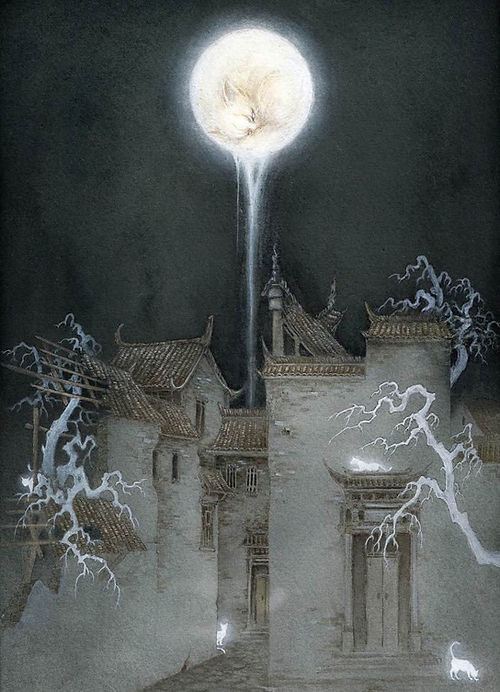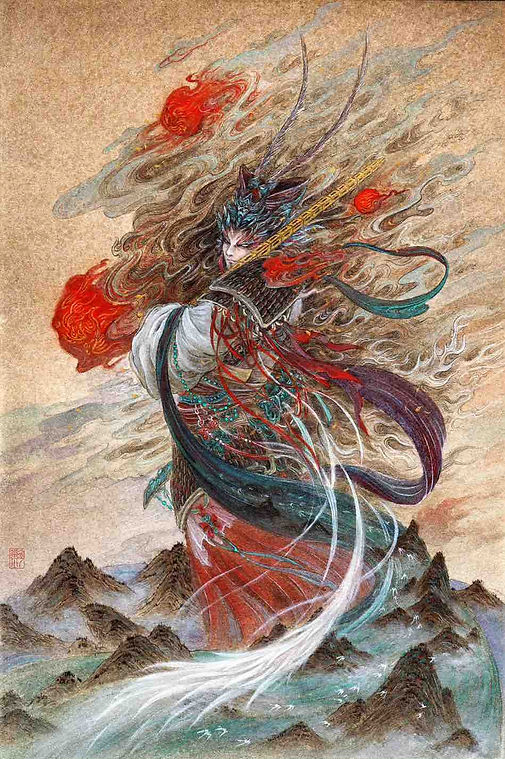
Mythical Beings: Soul, Spirit, Demon, Monster, Ghost, Devil, Deity, and God in Chinese Mythology
In Chinese Mythology, unseen forces shape and influence our world, each with its own unique powers and purpose: souls, spirits, demons, monsters, ghosts, devils, deities, and gods.
These entities are described in ancient classics and novels, portrayed in murals and historical paintings, worshipped in shrines and temples, and passed down from generation to generation through words in various legends and folklore.

Murals of Some Taoism Religion Deities in Chinese Mythology, inside the Yongle Palace (Built in 1247 — 1358) in Shanxi Province.
Soul — The Essence of Existence
Spirit — The Awakening of Consciousness
Demon — Deviation from the Norm
Ghost — Lingering of the Deceased
Devil — Evil Minds in the Heart
Deity — The Culmination of Cultivation

Chinese Gods, Goddesses, Deities, and Immortals in "Eighty-Seven Celestials" by Artist Wu Daozi (about 680 — 758).

Soul: The Essence of Existence
Soul, known as Ling (灵), is regarded as the essence of all things in the universe.
From the sun and moon to stars, clouds, mountains, rivers, stones, humans, flora, and animals, each entity possesses its own soul.
Typically, a soul is formless and unconscious, yet it serves as the fundamental essence of existence.
However, in special scenarios, some beings possess extremely powerful souls that enable them to communicate with or influence humans in certain ways.

These entities may include magnificent mountains, vast seas, ancient forests, or exceedingly ancient artifacts.
Some beings, after living long enough and absorbing essences from the sun, the moon, the earth, and their surroundings, would turn into Spirits.
Alternatively, certain encounters, such as an animal consuming a mythical herb or possessing a powerful treasure, can also lead to their transformation into Spirits.

"Mystical Mountains and Buildings" by Zhao Boju of the Southern Song Dynasty (1127 — 1279)

Spirit: The Awakening of Consciousness
Spirit, known as Jing (精), represents a soul with consciousness.
Once a being, whether an animal or a tree, transitions into a spirit, it begins to develop awareness, emotion, feeling, and desire over time.
Animals may seek greater strength to acquire food more easily, while plants may strive to move freely and explore a wider world.
Moreover, they desire longer lifespans.
As a result, some spirits choose to embark on further cultivation, progressing from limited consciousness to the formation of a complete personality.

Flora Moon Spirit, Painted by Artist Huahua

Demon: Deviation from the Norm
Demon, in Chinese Yao (妖), refers to entities that deviate from the norm, including animals and plants intending to transform into humans.
Demon encompasses cultivated spirits that have attained a full personality.
Moreover, some powerful entities, albeit not permanently, have the ability to transform into humans and think and communicate like them.

Fox Demon Transformed into a Beautiful Woman, Drawn by Zhang Wang.
As spirits and demons progress in their cultivation, they accumulate more magical power and may interact with humans.
Some may exhibit benevolent and kind behavior, while others may display the opposite.
Their alignment with kindness or evilness is determined by their own consciousness and personalities, much like humans.
The ultimate goal of their cultivation, if successful, is to ascend to human form, or even to become deities.

Image of Lady White Snake, A Well Cultivated Snake Demon, from Film "White Snake"

Monster: Failed Humanization
Monster, in Chinese Guai (怪), refers to the failed or negative consequences of the cultivation of Spirits and Demons.
While the ultimate goal of spirits and demons is to transform into humans or deities, not all of them can successfully navigate the challenging cultivation process.
Some of these unsuccessful beings may remain unchanged, disappear altogether, or transform into monsters.

Jinhua Cat Monster, Picture by Artist Shan Ze.
Monsters, who once attempted to become human but failed, may retain some degree of humanity, but often possess more inhuman traits.
Another perspective on monsters suggests that some beings inadvertently gain power, such as an animal consuming a mythical herb or acquiring a powerful treasure, but retain their beastly and inhuman instincts, never striving to cultivate humanity.
As a result, monsters are typically powerful yet tend to be cruel and bloodthirsty, often characterized by less pleasant appearances.

Jiuying Monster Fighting Against Hero Hou Yi, Picture by Artist Shan Ze.

Ghost: Lingering of the Deceased
Ghost, in Chinese Gui (鬼), refers to beings that have transformed from the deceased.
When living beings, including humans, animals, and plants, pass away, their remaining souls may become ghosts.
According to various religions and legends in China, some souls may reincarnate, others may become deities, and some may remain in the underworld.
However, a small number of them may linger in the human world, where they might encounter or be seen by humans.
This typically occurs because of strongly unfulfilled wishes or vengeances that keep them bound, or due to losing their way to the underworld for various reasons.
As a result, ghosts can exhibit both benevolent and malevolent traits, depending on their personalities and specific circumstances.

Deity Shen Shu the Guardian of Gate of the Ghosts' Realm, Painted by Artist Shan Ze.

Devil: Evil Minds in the Heart
Devil, in Chinese Mo (魔), originates from Buddhism and refers to evil intentions.
The devil represents more than just an entity; it embodies a path, a behavioral pattern, or one's values.
Anything that harbors evil intentions is considered devilish, representing the antithesis of righteousness and benevolence.
In the mythological realm, any being that strays onto the path of evil has the potential to become a devil.
However, more powerful entities have the capacity to wreak greater havoc and inflict more destructive damage.
However, devils have the potential for change. If they conquer their inner evilness and alter their paths, they can transform into good spirits or deities, and vice versa.
Nothing is permanent.


Deity: The Culmination of Cultivation
Deity, in Chinese Xian (仙), is the ultimate goal of all the cultivators, including humans, demons, spirits, monsters, and ghosts.
Some deities reside in heaven, others watch over the earth, and some dwell in the underground world, each bearing specific responsibilities in managing the cosmos.

Meanwhile, some deities opt for a carefree existence, traveling throughout the universe at their leisure.
Despite variations in their powers and duties, all deities are benevolent and mostly immortal.
However, should any deity engage in malevolent actions, they risk losing their divinity and immortality, reverting to their original status as spirits, humans, ghosts, demons, devils, or even souls.
Click to Read More About Mythical Deities in Chinese Mythology


God: The Supreme Divine Being
God, in Chinese Shen (神), includes the divine beings who are born with powerful and celestial souls.
Some are among the supreme existences, such as Pan Gu, the creator of the universe; Nu Wa, the creator of humans; and Xiwangmu, the Goddess of the Sacred Kunlun Mountains.
Some beings evolve from divine and powerful souls, such as the gods of the sun, the moon, the earth, sacred mountains, and beyond.
Over time, with the proliferation of different religions, folklore legends, and novels, the distinction between gods and deities became less clear.
Collectively, they are revered and worshipped as celestial beings with supernatural powers, safeguarding the universe with benevolent and merciful hearts.
Click to Read More About Chinese Gods and Goddess

Penglai Island Painted by Artist Qiu Ying (about 1498 — 1552) — Poly Art Museum
You Might Also Like:
Brief Introduction to Chinese Mythology — Origin and Special Characteristics
Chinese Gods in Creation Myth and Legend
Chinese Goddesses in Creation Myths and Legends, Religions, and Folklore
Mythical Deities in Chinese Mythology, Folklore, and Legends
Fantastic, Wonderful Worlds of Chinese Mythology
Mythical Creatures in Ancient Legends
Chinese Dragon or Loong — History, Power, Utilization, and Culture
The Nine Sons of the Dragon — An Ultimate Guide
Dragon King or Long Wang — Deity of Water in Chinese Mythology
Chinese Phoenix Fenghuang — Legend, History, Utilization, and Culture
The Five Types of the Fenghuang — Legends, Symbolism, and Influence
The Nine Sons of the Chinese Phoenix Fenghuang — An Ultimate Guide
Qilin — Mythical Creature of Benevolence, Strength, and Auspiciousness
Nine-Tailed Fox, Huli Jing, and Fox Spirit in Chinese Culture
Yin Yang and Taiji — Origin, Meaning, Symbol, and Utilization
Chinese Zodiac Signs — A Comprehensive Introduction
Chinese Astrology — Three Enclosures, Four Symbols, Twenty-eight Lunar Mansions

